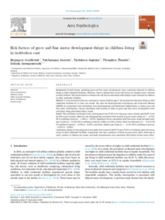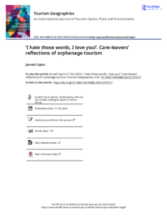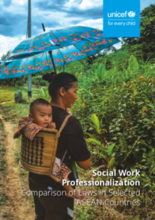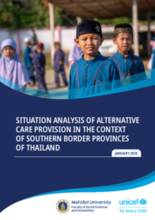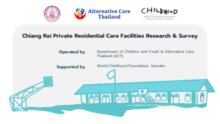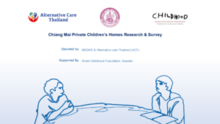This country page features an interactive, icon-based data dashboard providing a national-level overview of the status of children’s care and care reform efforts (a “Country Care Snapshot”), along with a list of resources and organizations in the country.
demographic_data
childrens_living_arrangement
children_living_without_bio
adoption
social_work_force
key_stakeholders
Key Stakeholders
Add New Datadrivers_of_institutionalisation
Drivers of Institutionaliziation
Add New Datakey_research_and_information
Key Data Sources
Add New DataThailand Alternative Care Case Study
Prevalence and number of children living in institutional care: global, regional, and country estimates
Displaying 1 - 10 of 103
This study identifies high rates of gross and fine motor delays among young children living in residential care facilities in Thailand and examines factors contributing to these developmental challenges. These findings highlight the developmental vulnerabilities of young children in residential care and point to key predictors that can inform early interventions.
This study explores the experiences of nine young Thai adults who grew up in a Christian orphanage supported by foreign volunteer tourists, highlighting the impact of these visits on the children. Findings reveal that while orphanages often used children to attract financial support, most volunteers provided fleeting attention, leaving children disappointed and vulnerable, emphasizing the need for orphanage models that prioritize the children’s needs over tourist interests.
This paper provides a comparative analysis of social work professionalization in the Philippines, Thailand, Indonesia and Singapore. By examining the different approaches across the countries, policymakers will have examples of practices that have been effective elsewhere and adopt these to suit the context of Malaysia.
This study addresses a critical knowledge gap regarding alternative care in Thailand's Southern Border Provinces (Pattani, Yala, Narathiwat, Satun, and Songkhla), where the population is predominantly Muslim with a strong ethnic Malay identity. The research investigates various forms of alternative care, including institutional care (Pondok and Hafiz institutions, government boarding schools, private orphanages) and family-based care, examining the quality of care, available social services, and cultural context.
This article seeks to learn more about the experiences and perspectives of those who spent their childhoods in institutional care in Thailand and how they compare with international research on this topic.
The Alliance is accepting applicants to join the Training of Facilitators on Engaging Community Volunteers in Case Management in Bangkok, Thailand in November 2024. Deadline to apply is September 22.
This is the third Global Forum for a World Without Orphans to be held 29 February 29 - 03 March 2024 in Chiang Mai, Thailand.
This is a summary of every private residential care facility in the Chiang Rai Province of Thailand, including institutional care homes, children’s homes, and residential schools. This summary provides an extensive and useful data set for those interested in the reform of private children's homes.
This is a summary of children's homes in the Chiang Mai Province of Thailand over the last 1.5 years. The research team visited a total of 371 private children's homes. This summary provides an extensive and useful data set for those interested in the reform of private children's homes.
Date: Tuesday 10 October 2023
Time: 10:00 (UTC/GMT +02:00 - Europe / Brussels)

